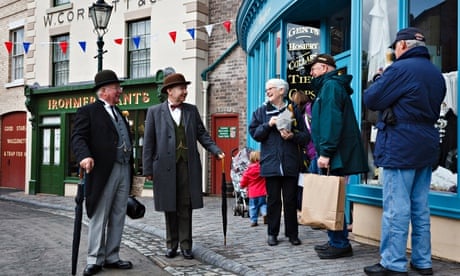In the council chamber of York's Guildhall a visitor from the Victorian age, a professor of criminology with a penchant for wearing a deerstalker, is about to lecture an eager group of Britain's growing number of fans of immersive theatre. The production in rehearsal, Sherlock Holmes: A Working Hypothesis, is just one of many theatrical events being staged this summer that will allow audiences to interact with actors, often in a "site specific" location that creates a complete world for the performance.
Next month, London patrons of the highly successful Secret Cinema will be offered still greater scope for time travel when they are invited "back to the future" for special screenings of producer Steven Spielberg's hit film. The cult company's most ambitious event will bring Hill Valley, California, to life not only in the mid-1950s but also in lead character Marty McFly's native 1980s.
Both shows are part of a boom in mainstream demand for immersive experiences that has created an increase in work for jobbing actors. In an industry where it is notoriously hard to find work, there is a plethora of interactive roles on offer – from "character host" at a theme park or heritage property to a scripted role in a promenade show.
So far this summer, London theatregoers have been invited on an eerie tour through Holland Park after the opera, to examine the future of the NHS on an ambulance shift or to join the crew of a whaling ship hunting down Herman Melville's Moby-Dick. A roving production of Macbeth in east London required its audience to give up half a day, while last month's Angel Meadow show in Manchester pulled ticket holders down to the depths of a former Irish slum. And now that corporate events and wedding coordinators are taking an interest, what was once an anarchic corner of live performance has become a fashionable attraction.
"It's great it is so prominent," said Joanna Read, principal of Lamda, the London Academy of Music and Dramatic Art. "It can be exciting, visceral work and many of our students are huge fans of companies like Punchdrunk. Our training prepares them for this kind of work with audiences by building up their ability to work on their own."
Even the trend for corporate "character roles" offers students bread and butter work, said Read: "There is always a need for extra work and certain sectors of business have realised there is a lot of acting skill out there they can put to good use."
Observer theatre critic Susannah Clapp notes that even conventional stage shows now frequently start with extra character work in the lobby and, as in the current West End production of Richard III starring Martin Freeman, audiences are often much closer to the action – to the extent of being spattered with stage blood. "It has permeated lots of aspects of theatre, and on the whole that is a terrific thing," said Clapp. "If people think theatre is dying, or audiences are ageing, they need to take these shows into account. Young people are coming, perhaps because drama is taught in schools now or because they are hungry for live performance as so much time is spent on screen."
Some emphasis on storytelling can be lost, Clapp warns: "But the best shows leave you feeling changed when you return to the real world. And not every play is going to be site-specific or interactive, nor should it be. It is just another tool."
Alexander Wright, the writer of York's Sherlock show, is a longtime champion of interactive theatre and wonders if wider familiarity with computer games is behind the boom. "There is some relation to game theory," he said. "Different shows allow a different level of agency to the audience. You have to let them know what is expected and whether they can affect the action."
When Wright first put together an immersive show six years ago with the company Belt Up, some clueless punters thought they would perform underwater. "It was a real adventure then and amazing to talk to an audience; you have a really shared experience. Now it feels more like a popular movement."
Wright believes the work is best learned on the job. "You have to feel comfortable with an audience. It is quite hard to teach. Actors always say no performance is the same, but in this case that is really true."
Greater corporate work for actors is also a boon, he said. "Actors' skills are more transferable now, and there are some very high-end versions out there, where you can have dinner surrounded by characters from a play or a film. Corporations are learning how to deliver all kinds of experiences."
The actors' union, Equity, is pleased by the growth in interactive shows, but urges actors to avoid exploitation. "There's a lot of new work out there, ranging from character hosting at the London Dungeon to scripted work," said Martin Brown, Equity's assistant general secretary. "We discourage actors from working for free, but some is quite well paid."
Secret Cinema's Fabien Riggall said the company employs between 500 and 1,000 paid actors a year. Some volunteer roles among the audience appear to be advertised, too, in return for expenses and food.
"Our actors are some of the best in this field, highly experienced and highly professional," said Riggall. "Secret Cinema isn't for every actor, but it is for artists who are looking to take the plunge into what we believe is a new way to experience culture. We don't see it purely as cinema or theatre – actors become part of the world we create and what we're trying to convey to the audience."

Comments (…)
Sign in or create your Guardian account to join the discussion